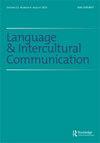Banal, civic, and cultural nationalism in the United Arab Emirates: paradoxical discourses and complexities
IF 2.2
1区 文学
0 LANGUAGE & LINGUISTICS
引用次数: 2
Abstract
ABSTRACT Unlike other areas of the Middle East, where nationalism indexes war, border disputes and the dichotomy of ‘us / them’, nationalism in the UAE is usually considered ‘banal’. Banal nationalism, which refers to everyday unconscious flagging of nationalism, receives less attention than ‘hot’ nationalism. However, banal nationalism is not benign. Rather, chronotopic complexities in ‘imagined communities’ impact intercultural communication and belonging in diverse societies. With almost 90% of the UAE’s population being foreign residents, many residents have loyalties and ideological habits from both their country of birth and country of residence. Here, a ‘third space’ often emerges whereby notions of belonging are complex and multilayered. Paradoxical discourses around the creation of ‘authentic’ national spaces run parallel to discourses of tolerance and cosmopolitanism. This article aims to critically assess the implications of contemporary banal, civic, and cultural nationalism to inform future research directions in the UAE setting and beyond.阿拉伯联合大公国平庸的、公民的和文化的民族主义:矛盾的话语和复杂性
与中东其他地区不同,民族主义以战争、边界争端和“我们/他们”的二分法为指标,阿联酋的民族主义通常被认为是“平庸的”。“平庸的民族主义”指的是日常无意识的民族主义,相比“热的”民族主义,受到的关注更少。然而,平庸的民族主义并不是良性的。相反,“想象社区”中的时间顺序复杂性影响了不同社会的跨文化交流和归属感。阿联酋近90%的人口是外国居民,许多居民对出生国和居住国都有忠诚和意识形态习惯。在这里,“第三空间”经常出现,归属感的概念是复杂和多层次的。围绕“真实的”民族空间创造的矛盾话语与宽容和世界主义的话语并行。本文旨在批判性地评估当代平庸、公民和文化民族主义的影响,以告知未来阿联酋环境及其他领域的研究方向。
本文章由计算机程序翻译,如有差异,请以英文原文为准。
求助全文
约1分钟内获得全文
求助全文
来源期刊

Language and Intercultural Communication
Multiple-
CiteScore
3.00
自引率
47.40%
发文量
50
期刊介绍:
Language & Intercultural Communication promotes an interdisciplinary understanding of the interplay between language and intercultural communication. It therefore welcomes research into intercultural communication, particularly where it explores the importance of linguistic aspects; and research into language, especially the learning of foreign languages, where it explores the importance of intercultural perspectives. The journal is alert to the implications for education, especially higher education, and for language learning and teaching. It is also receptive to research on the frontiers between languages and cultures, and on the implications of linguistic and intercultural issues for the world of work.
 求助内容:
求助内容: 应助结果提醒方式:
应助结果提醒方式:


